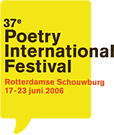Poet
|
Tsjêbbe Hettinga 1949-... country: Netherlands language: Frisian |
Since the death of the poet Obe Postma (1868-1963), there had been little news from the Frisian front of Dutch literature. A new interest in Frisian letters was born when Tsjêbbe Hettinga arrived on the scene. In 1995 he published a bilingual collection of his poems entitled Vreemde kusten / Frjemde kusten (‘Strange Shores’), presenting Hettinga’s Frisian poems side by side with Dutch translations by Benno Barnard. This collection gave Dutch readers a first taste of Hettinga’s work, which was already fairly well known in Friesland itself. Remarkably, Hettinga’s poetry owes nothing to prevailing trends in contemporary literature. Rather, it seems to conjure up such pre-war models as Roland Holst, Slauerhoff and Marsman. Hettinga’s style is epic, like that of his great predecessor Obe Postma. Hettinga’s Frisian landscapes are universal rather than locally defined. His vocabulary is mythical, his images are visionary. Life, as he evokes it, is first of all a sensual experience. Occasionally there are strong reminiscences of the Irish poet William Butler Yeats. On the whole, the names coming to mind when reading Hettinga’s verse are no longer very relevant to his Dutch contemporaries, yet his work is strong enough to revive an interest in such grand, atmospheric poetry. Another remarkable aspect of Hettinga’s poetry is the way this, virtually blind, poet, presents his own work. More than any poet in the Dutch language area he seems to belong to the old bardic tradition; he does not look, he sees. There is no doubt that Hettinga is Friesland’s leading living poet, nor can there be much doubt that the wider impact of his work makes him a unique presence on the Dutch poetic stage. Author: Rob Schouten Poets: |


